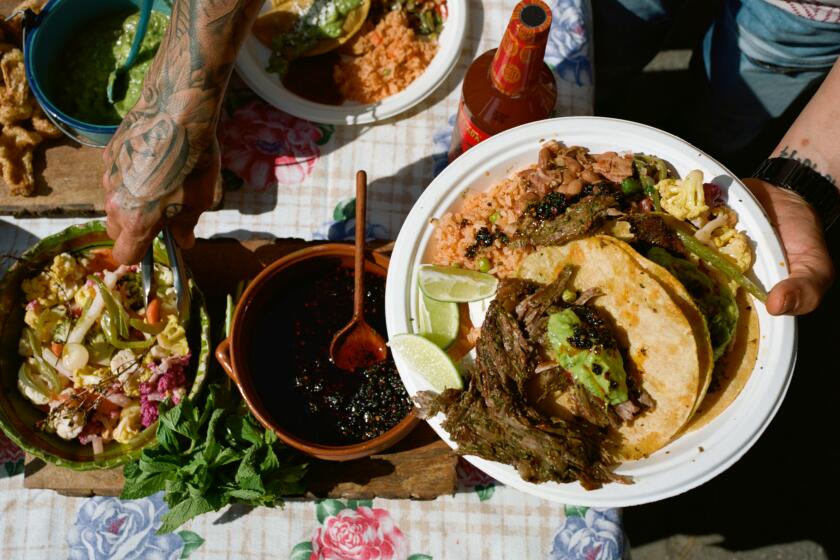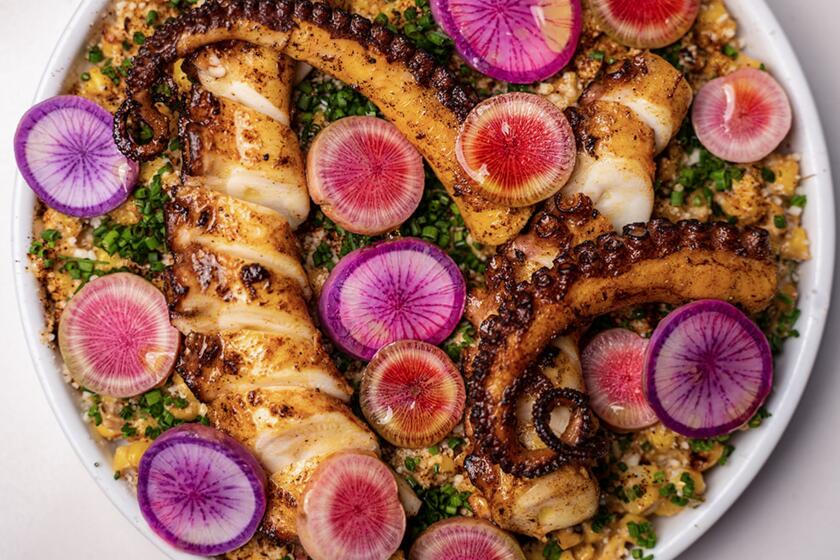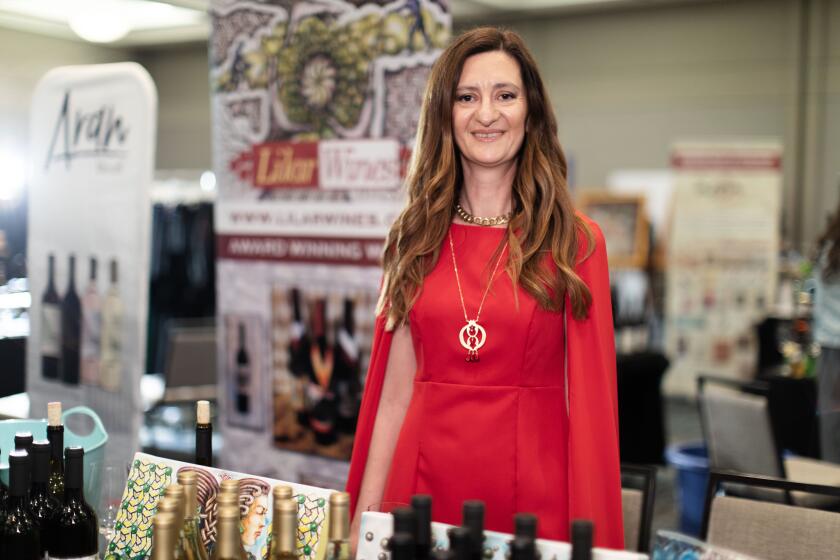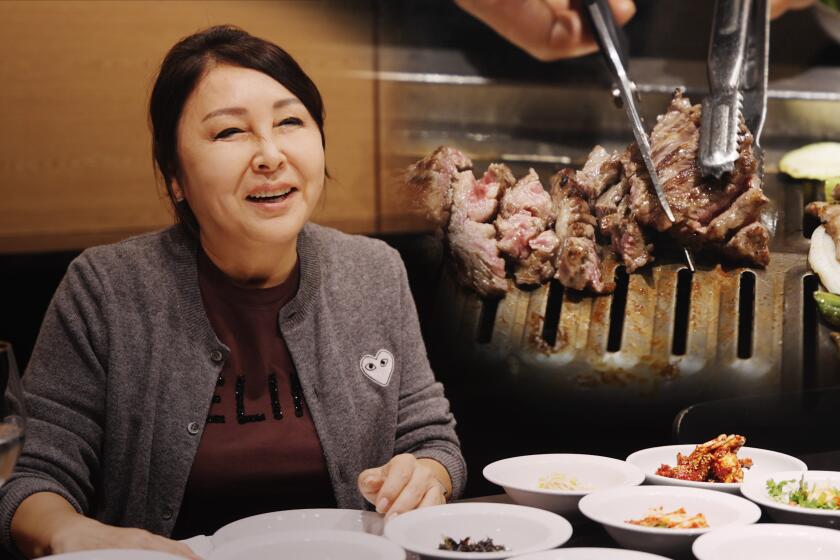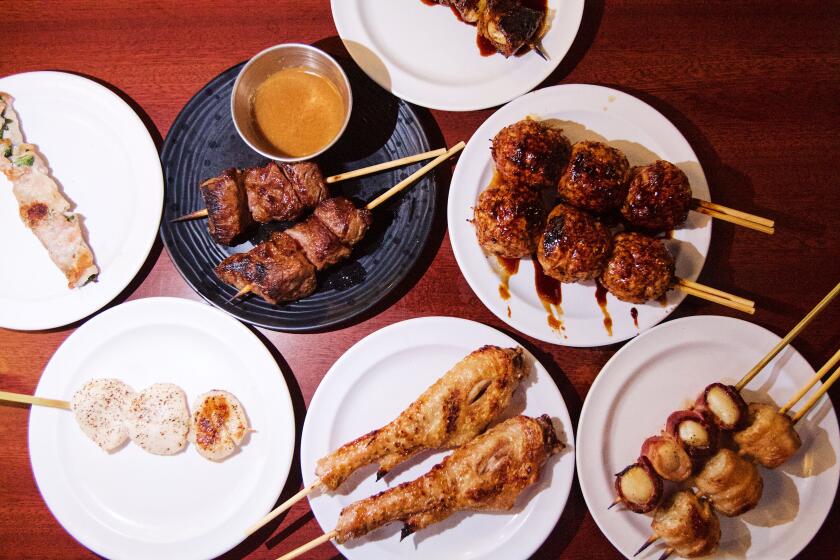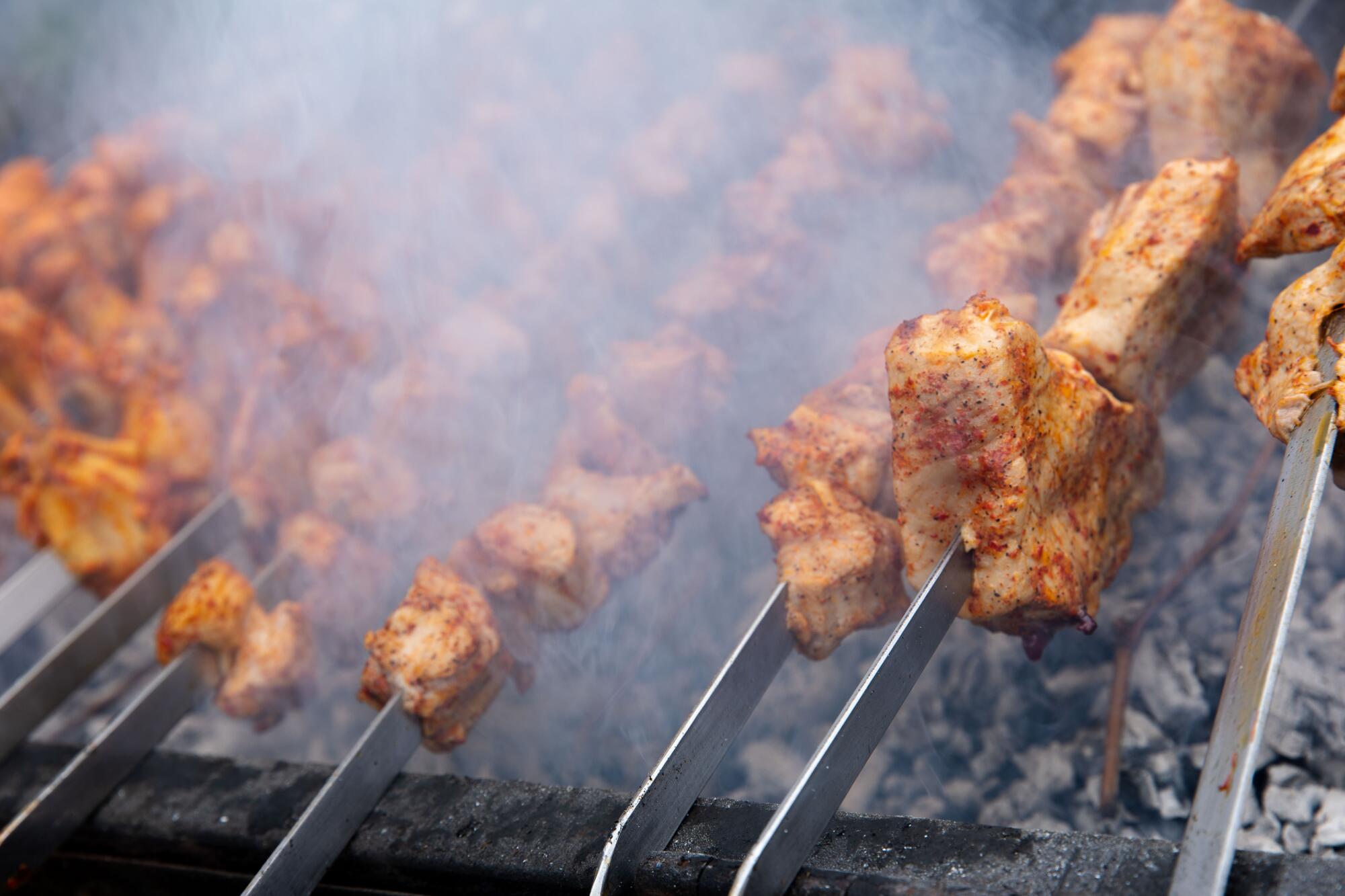
- Share via
“Without meat, I don’t have a life.”
Alex Khachoyan, 64, is layering chunks of orange-tinged chicken breast onto metal skewers in the backyard of his Pasadena home. He deftly works the meat onto each spear without looking, a muscle memory he’s developed over decades of cooking for family, friends and customers.
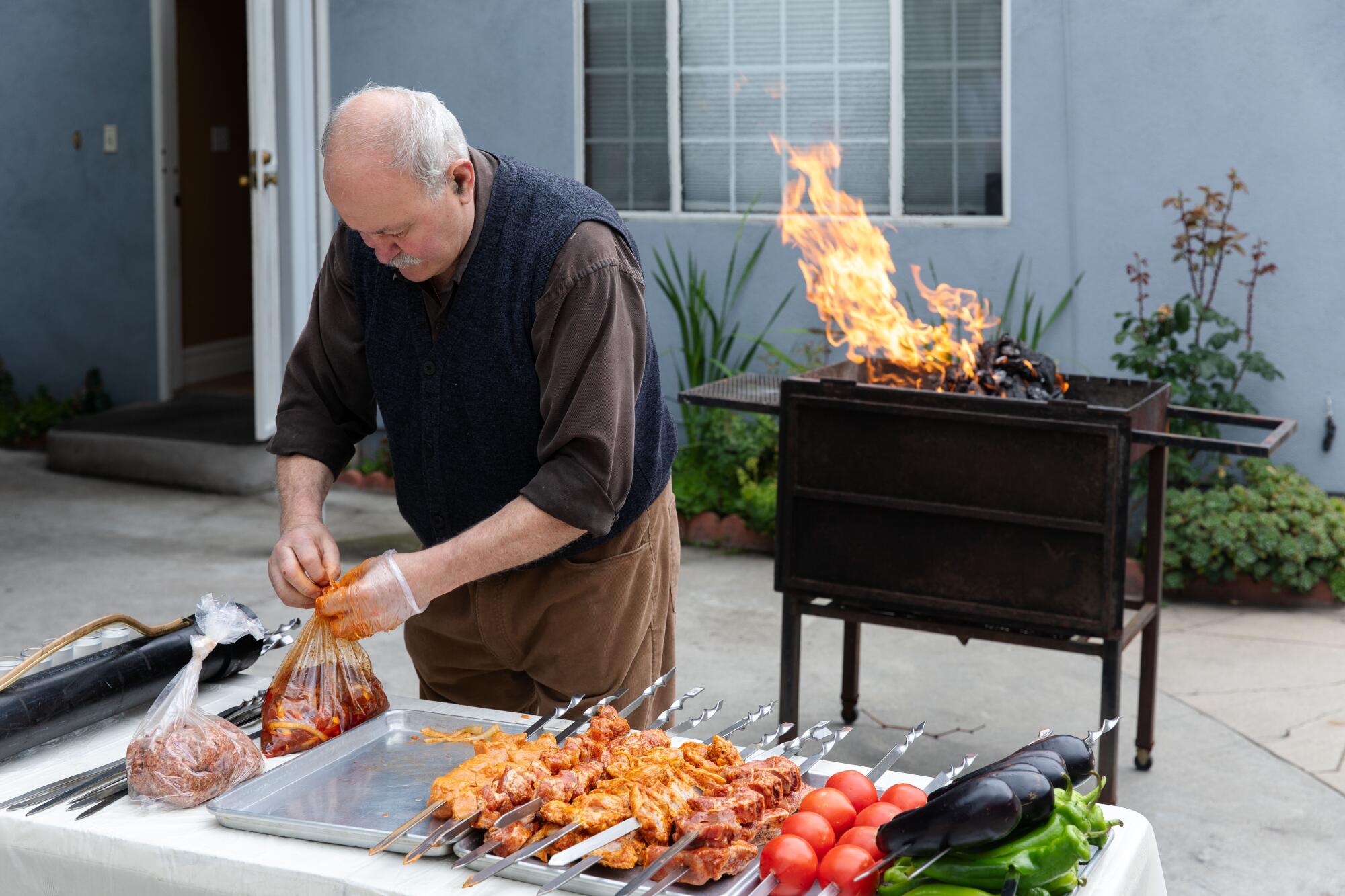
“I’m eating barbecue almost every day,” he continues.
Grilling with his family is a weekly ritual for Khachoyan, who runs Garni Meat Market on a stretch of Washington Boulevard in Pasadena known as Little Armenia. Following advice from his doctor, he left his job as an auto body painter to open the butcher shop nearly 30 years ago. Now, he works alongside his son Harout, 28.
The shop is named for the village in Armenia and the Garni temple, believed to have been built around AD 77. It’s also an homage to the memory of a late friend who lived there.
“And my mom said Garni is a nice name,” he says.
Japanese yakitori. Middle Eastern kebab. Argentine and Chilean asados. Thai satays. Korean barbecue. All contribute to the great cacophony of how we cook with fire in Los Angeles.
It’s just after noon on a recent Monday, and Alex and Harout are working together to prepare a meal for family and friends.
“We grill at least once a week, if not more,” says Harout, dousing a mound of coals in a grill with lighter fluid. “In the summertime, it’s a lot more. But we grill even if it’s raining. Nothing stops the barbecue.”
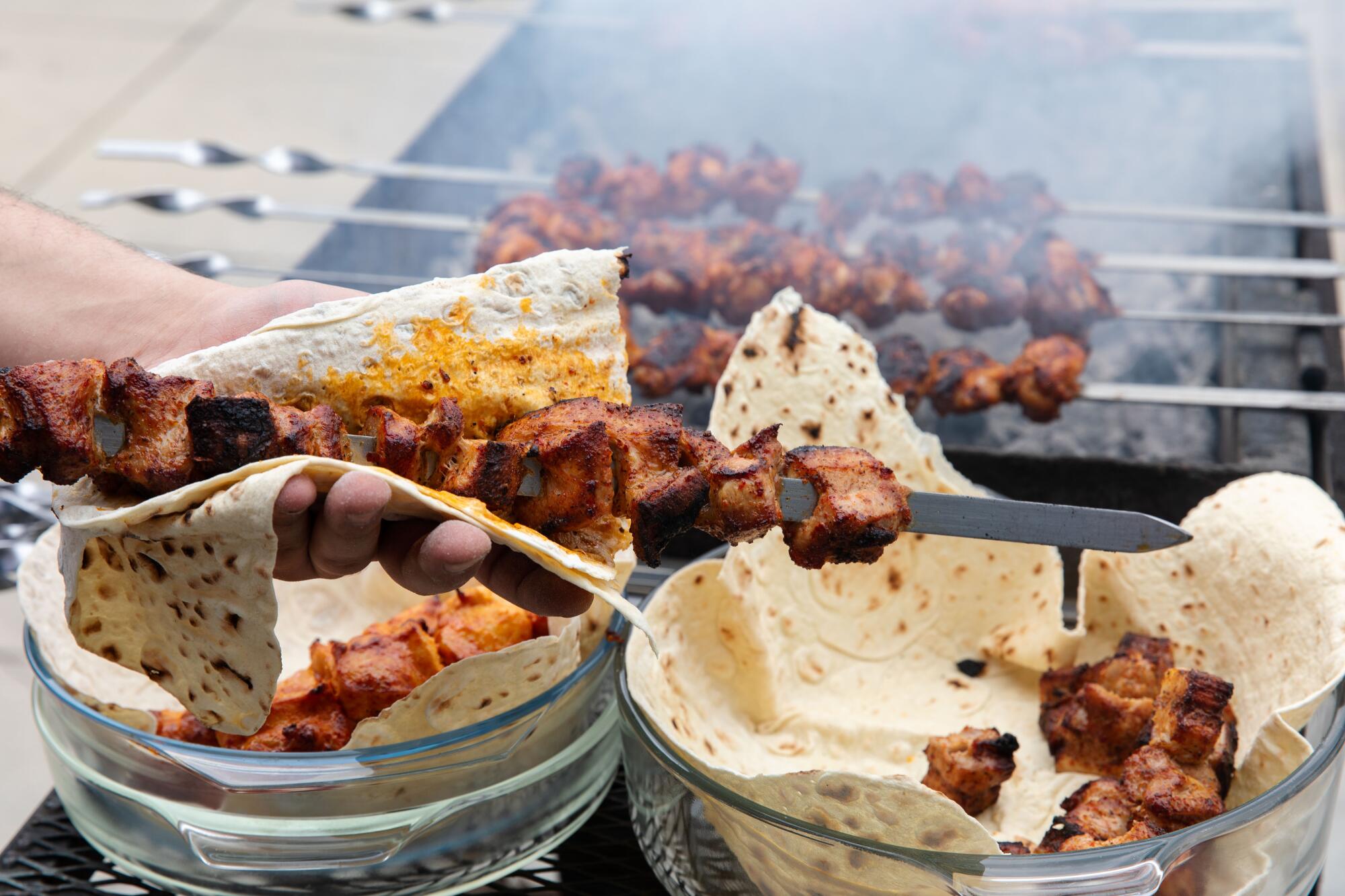
Armenian chefs and restaurateurs in Los Angeles are experimenting with new, modern takes on Armenian cuisine and branching into beloved food cultures like Mexican and Japanese cuisine.
He uses a match to set the coals ablaze in a grill outfitted with a shallow, wide bed and slits along the edges designed to hold skewers. They call it an “Armenian” grill, and for $185 at the shop, you can have one too.
“You call somebody and say we’re doing khorovats, which means we’re grilling,” says Harout. “It’s an Armenian thing. That’s a sign to come over. It’s a family event and it’s really important to my culture.”
On a table nearby, Alex continues to skewer the day’s lunch, a selection of proteins prepared at the shop: filet mignon in a dry marinade of black pepper, paprika, Aleppo pepper and onions; pork chops and squares of pork belly heavily seasoned with salt, black pepper and Aleppo pepper; lemon pepper chicken wings; ground lamb studded with sweet onion; and chicken breast marinated in yogurt and mayonnaise, fresh garlic, paprika and salt.
Alex and Harout make 14 marinades for the shop, displayed in a glass case that runs the length of the store. In addition to the marinated meats, there are Tomahawk steaks, the dry, spicy sausage sujuk Alex makes himself and a selection of dips and spreads including hummus, Alex’s own yogurt, ajika and jajuk.
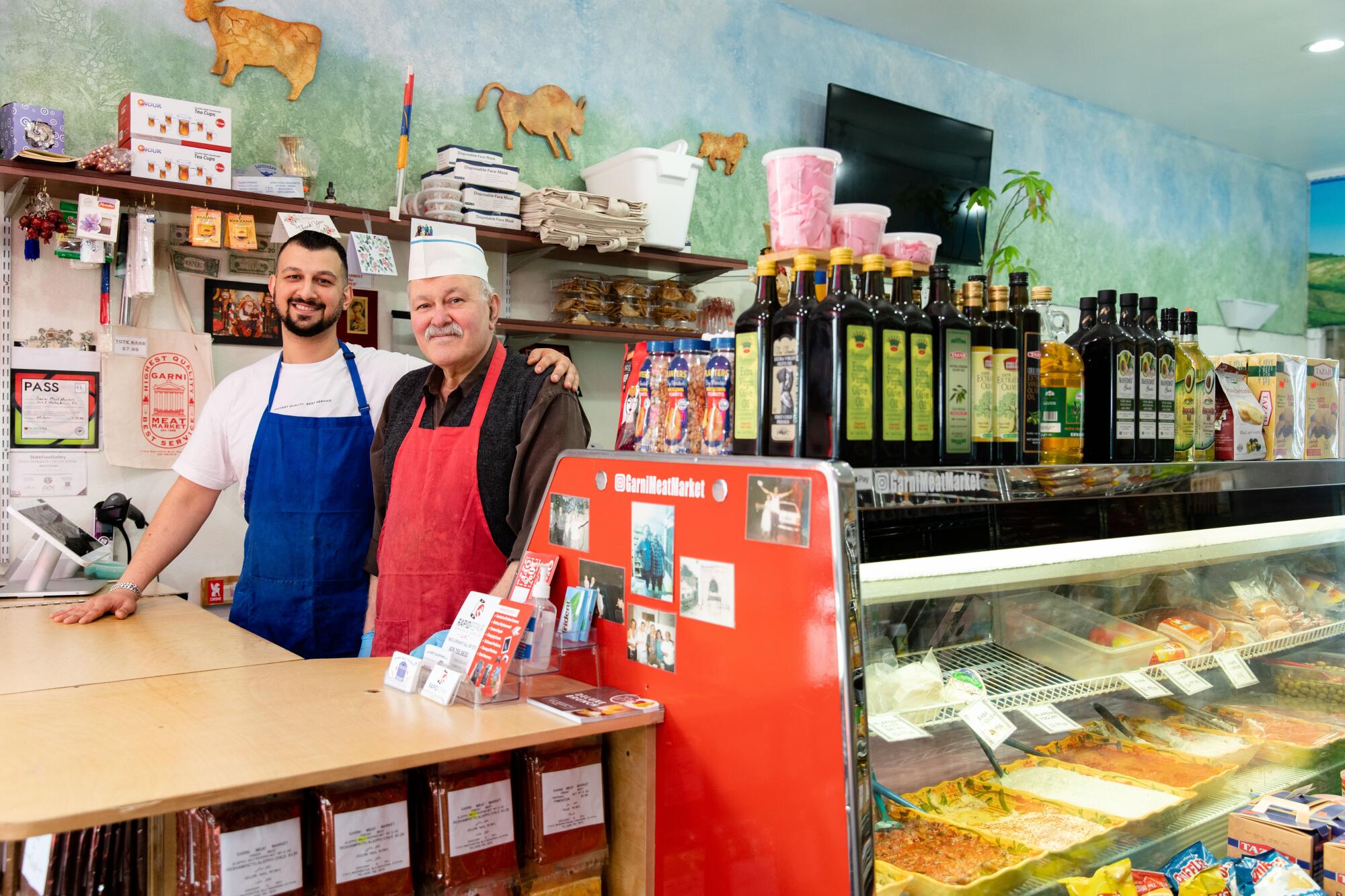
They’ve brought a little bit of everything home with them for lunch. Alex’s wife, Tina, 63, is in the kitchen making rice pilaf, and Harout’s wife, Karen, 27, is nearby scooping the various dips into bowls alongside Tina’s homemade pickles and salads.
Harout tends to the fire, using a hair dryer attached to a long extension cord to hurry the coals toward white-hot. He sticks a bare hand into the grill to move a piece from the outer rim to the middle.
Next, Alex skewers green peppers, eggplant and tomato. The vegetables are the first on the grill.
“Without these vegetables, we don’t eat the barbecue,” he says. “We roast them, pull the skin off, chop it up, then add cilantro, parsley, garlic, onion, olive oil and salt to make a salad.”
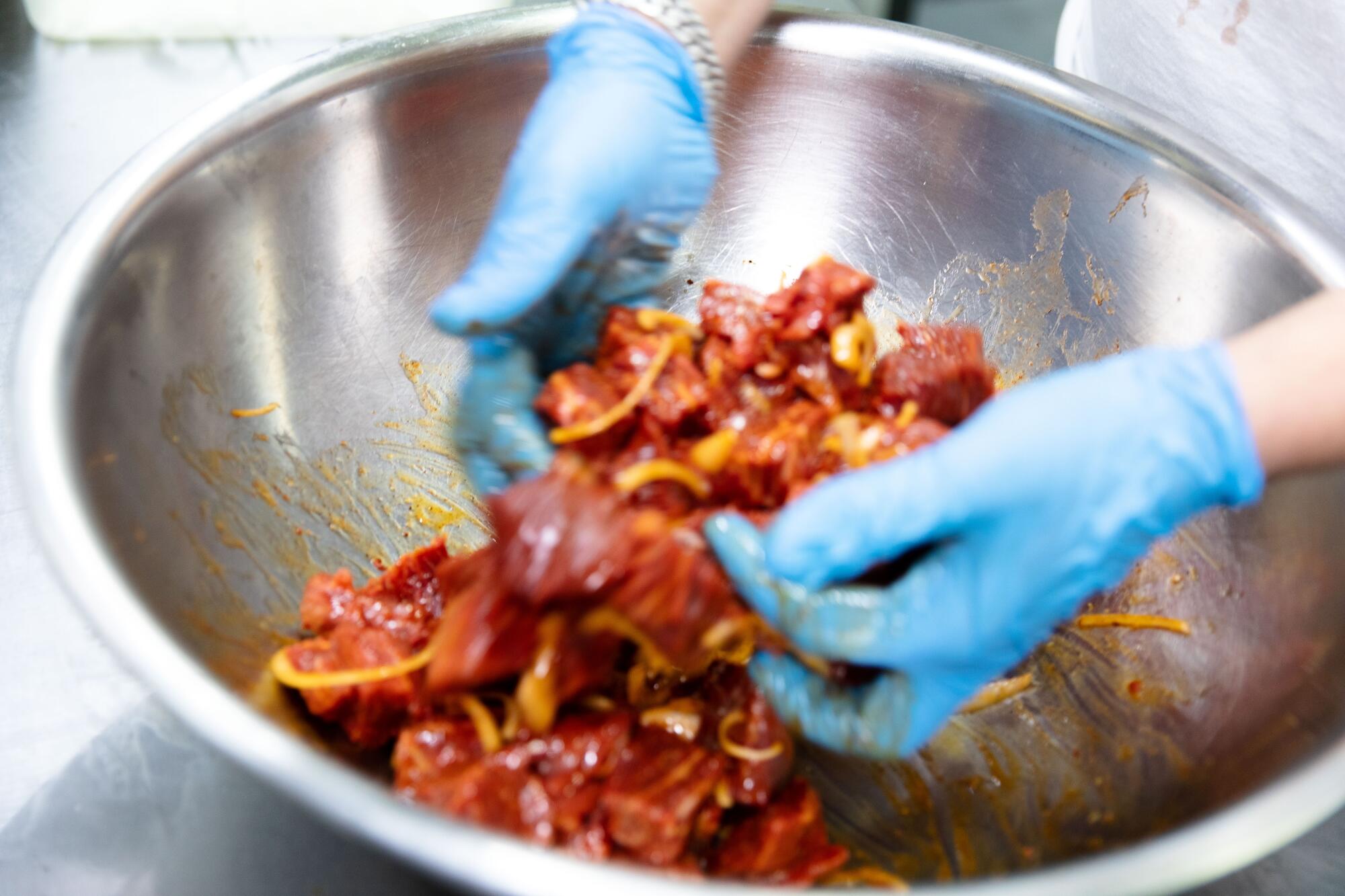
It’s no surprise that Los Angeles, home to a thriving Armenian community, proves one of the best places to try Old World Armenian wines, which use traditional methods to create robust reds and effervescent orange and natural wines.
As soon as the vegetables are removed, the grill is filled with meat. The skewers are packed in close but never touching. Harout draws from a stack of dried grape vines underneath the grill and adds them to the fire. Throughout the year, they cut the vines growing off the side of the house and save them to use while grilling. During walnut season, they throw in the walnut shells.
“It’s more tasty,” Alex says. “It adds more flavor.”
It also enlivens the smoke, now sweeping and falling from the grill in thick gray clouds. Even from across the backyard, you can taste the smoke on the wind.
“I making this,” Alex says, proudly pointing to a long cylinder that holds dozens of metal skewers. It looks like a quiver, made from a sewer pipe he closed off at one end and a handle fashioned from a damaged piece of car molding.
“I making the car. I making the home. I making everything,” he says, his woolly mustache twitching as he laughs.
He also made the metal skewers, using a vise to twist the metal to create handles at the ends. He calls them Armenian swords.
When it’s time for the ground lamb, Harout keeps a close eye on the meat, hand-pressed into cigar-like patties along the skewers.
“You have to keep rotating them so they don’t fall off and cook on both sides,” he says.
While about half of Garni’s customers have their proteins grilled at the store, many buy the marinated meat and rely on the Khachoyans for grilling tips to cook at home. The family is adamant about the use of a charcoal grill, but they’ll offer instructions for alternative forms of grilling, baking or pan-frying.
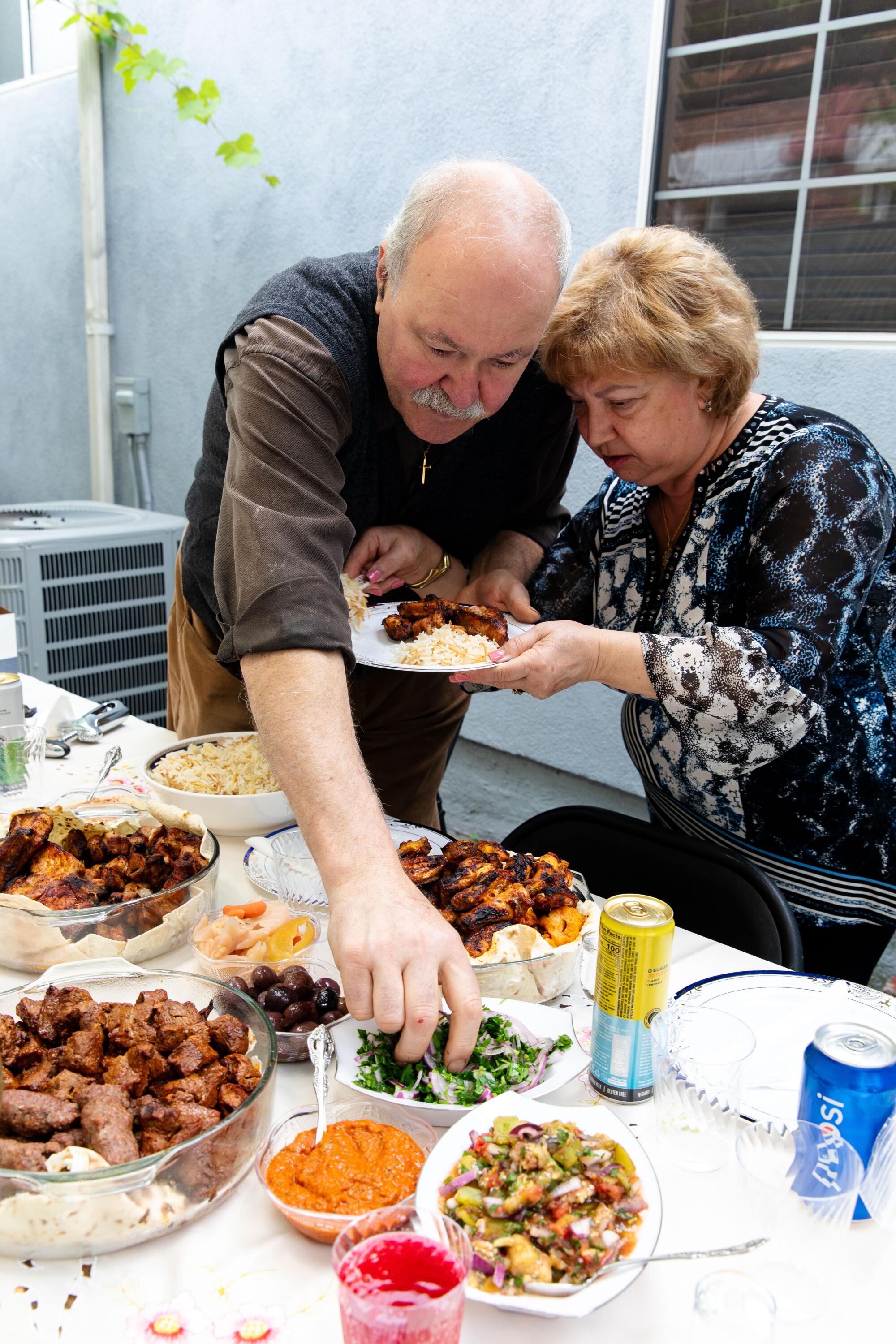
Jenee Kim’s Koreatown restaurant Park’s BBQ is an essential part of the flavors of Los Angeles — showing a generation of diners that Korean food is a thriving, evolving cuisine.
A little more than a year ago, the family started offering plates of grilled meat, rice and vegetables that you can eat on the patio out front.
As the meat nears ready, Harout rips open a package of mottled lavash and slides out a flat piece of bread about 3 feet long. He tears off a piece and uses it as a makeshift glove to remove a piece of pork belly from a skewer. He nonchalantly pops the steaming piece of meat into his mouth, oblivious to the heat.
He then offers a piece to a friend he’s invited over for lunch, who seems to appear out of thin air as soon as the meat is ready.
“Usually we’re really full before we even get to the table,” Harout says, still chewing. “We will be picking at the meat while we grill.”
He layers some serving dishes with bread, then continues to remove the meat from the skewers, piling the pork, chicken, lamb and beef over the lavash. The family takes turns bringing the meat to a table on the side of the house, already full of pickles, salads, spreads and wine glasses. There’s also an ice-cold bottle of vodka and empty shot glasses waiting.
The platters are passed around the table, with everyone choosing their favorite cuts. Harout prompts his father to take the “good piece” of pork chop, the one with a nice rim of fat caramelized around the bone.
Alex makes himself a bite of food with a piece of torn bread, pork and a scoop of his grilled vegetable salad.
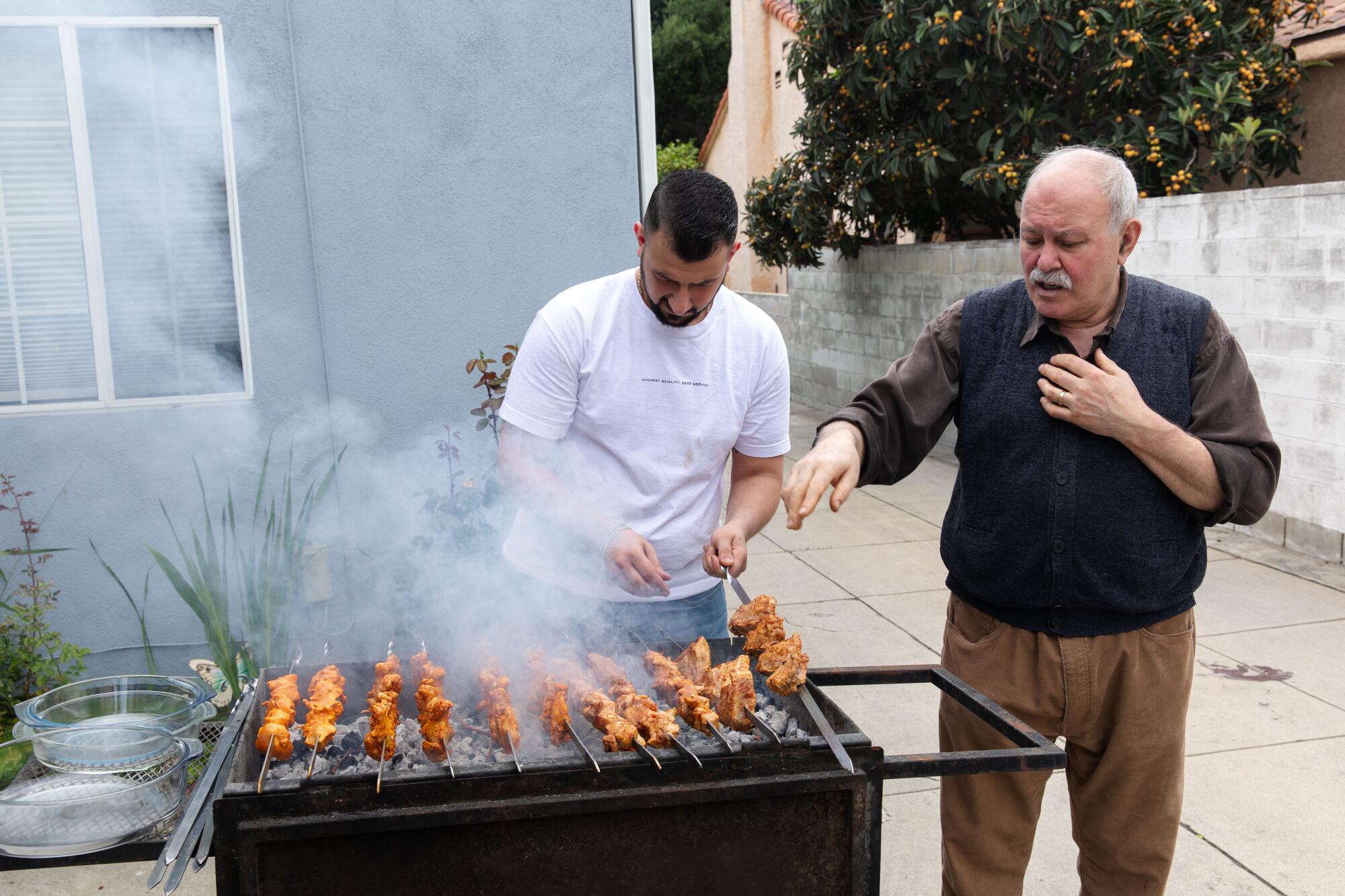
L.A. is home to traditional yakitori and kushiyaki, as well as modern spins that add California flavor to the beloved Japanese cuisine. Here’s where to find the best skewered meats grilled over binchotan charcoal.
“Armenian people don’t eat barbecue with a fork and knife,” he says. “They eat with hands. You taste it more.”
The filet mignon is impossibly tender, almost melting into the lavash beneath. The chicken is vibrant with Aleppo pepper, springy but still moist. The pork chop bones are excavated for every last morsel of meat. The luleh kebab, full of onion and paprika-infused juices running wild, is the first to disappear.
Wine is sipped. Vodka is shot back. The platters of food slowly diminish as the conversation becomes more lively, everyone more animated and a little glassy-eyed.
It’s a scene that plays out in countless Garni customers’ homes and backyards, fueled by the Khachoyans’ marinated kebabs.
“Having the shop makes us feel like you’re providing a service, but it’s something more than that to the families coming in,” Harout says. “We’re part of a very tight-knit Armenian community, and sometimes, our store gets to be at the center of it. ”
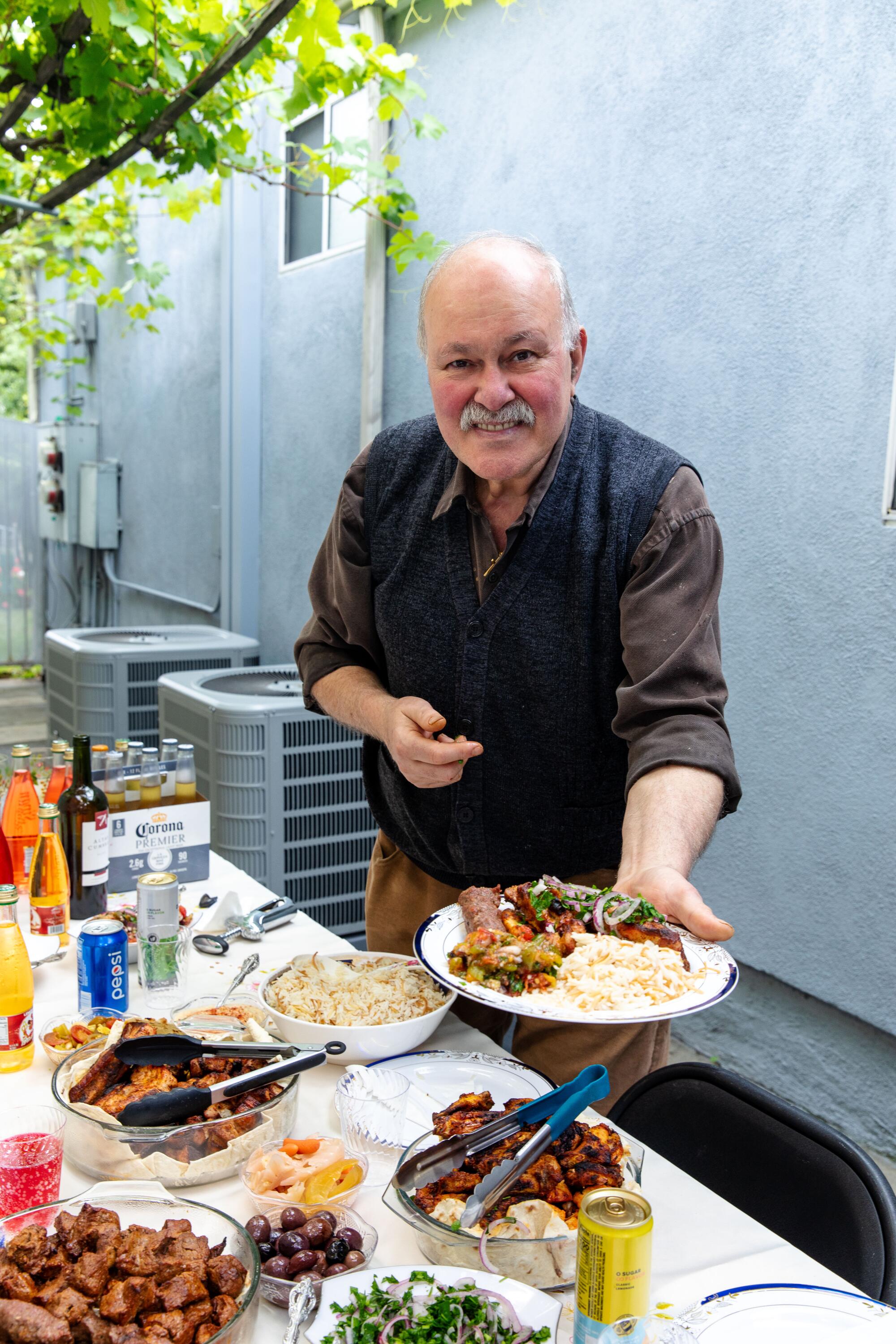
Where to buy meat for grilling
Garni Meat Market, 1715 E. Washington Blvd., Pasadena, (626) 798-2676
More to Read
Eat your way across L.A.
Get our weekly Tasting Notes newsletter for reviews, news and more.
You may occasionally receive promotional content from the Los Angeles Times.
